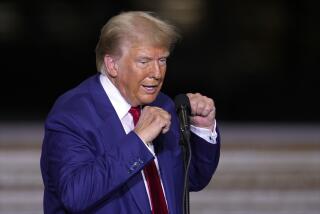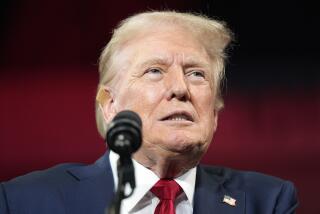Lawsuit alleges President Trump violated 1st Amendment by blocking U.S. citizens on Twitter
- Share via
With each tweet, President Trump says he’s redefining the American presidency, describing his use of social media as “modern day presidential” and necessary to fight what he deems fake news.
Not everyone agrees on the substance of Trump’s social media message, but both his supporters and detractors have something in common: They want access to Trump’s frenetic Twitter feed.
Which is why the Knight First Amendment Institute at Columbia University filed a federal lawsuit Tuesday on behalf of seven Twitter users who say their 1st Amendment rights were violated after they were blocked from reading Trump’s personal account (@realDonaldTrump, not the official @POTUS account) after criticizing him or his policies.
The suit, filed in U.S. District Court in the Southern District of New York in Manhattan, names Trump, White House Press Secretary Sean Spicer and White House director of social media Dan Scavino as defendants. The Knight Institute sent a letter to the White House last month threatening legal action if it didn’t heed its call to unblock followers.
“President Trump’s Twitter account has become an important source of news and information about the government, and an important forum for speech by, to, or about the president,” Jameel Jaffer, the Knight Institute’s executive director, said in the letter. “The First Amendment applies to this digital forum in the same way it applies to town halls and open school board meetings. The White House acts unlawfully when it excludes people from this forum simply because they’ve disagreed with the president.”
Winning in court won’t be easy, 1st Amendment experts say. The sheer size and digital nature of Twitter means courts will probably hesitate to call it a public forum the way a physically constrained setting such as a town hall can be considered a public forum. Add to that the president’s own 1st Amendment rights, which one could argue allow him to communicate with or without anyone he chooses.
Being blocked by the President Trump might be a badge of honor for some people, but when it happened to me, I only felt a deep sense of unease.
— Joseph Papp
Blocked users can still see Trump’s tweets by logging out of their own accounts, or when the tweets are embedded on other Web pages. They can also opt to start another account and follow the president.
The Knight Institute says that because of the blocking of dissent, Trump’s Twitter feed has become an echo chamber that stifles healthy debate (even if a large portion of the comments, because of profane language, would never be confused for constructive discourse).
The plaintiffs in the lawsuit include Eugene Gu, a surgery resident in Nashville, Tenn.; Holly Figueroa, a songwriter and organizer in Seattle; Joseph Papp, an author in Pittsburgh; Nicholas Pappas, a comedy writer in New York; Brandon Neely, a police officer in Houston; Rebecca Buckwalter-Poza, a writer and political consultant in Washington and Philip Cohen, a university professor in Silver Spring, Md.
“Being blocked by the President Trump might be a badge of honor for some people, but when it happened to me, I only felt a deep sense of unease,” Papp, a registered Republican, said in a statement. “Everyone being able to see the president’s tweets feels vital to democracy.”
Papp was blocked a day after he replied to a Trump weekly video address by writing “Greetings from Pittsburgh, Sir” and “Why didn’t you attend your #PittsburghNotParis rally in DC, Sir?”
Though not blocked by Trump, the Knight Institute included itself as a plaintiff because it contends that any exclusions to the president’s Twitter following (33.6 million and counting for @realDonaldTrump) violates all Americans’ access to dissenting views.
It’s unknown how many people are blocked by Trump. Twitter won’t comment on private accounts. A Los Angeles Times report in December focused on people from all walks of life, including a high school student, who had been banned from following the president for perceived criticism.
Wired magazine has begun compiling a list of some of the more notable people and accounts to have been stifled by the president on Twitter, including VoteVets.org, a veterans advocacy group, and the bestselling horror writer Stephen King.
Follow me @dhpierson on Twitter
ALSO
Donald Trump Jr. emails reveal knowledge of Russian government offer to aid father’s campaign
Trump ratchets up attack on media with video that shows him body-slamming CNN stand-in
All jokes aside, Trump’s ‘covfefe’ tweet sparks questions too
Trump extends his feud with former FBI Director Comey
More to Read
Inside the business of entertainment
The Wide Shot brings you news, analysis and insights on everything from streaming wars to production — and what it all means for the future.
You may occasionally receive promotional content from the Los Angeles Times.











